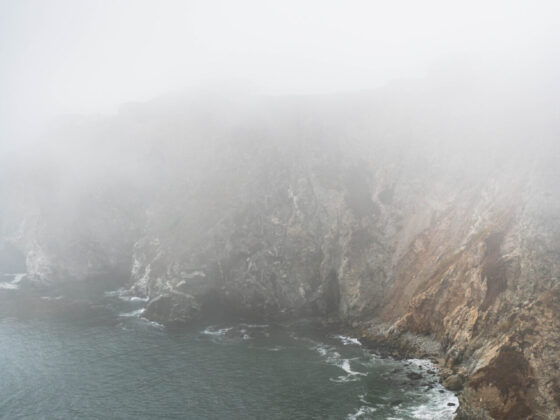When I was hired as an Assistant Professor of Biblical Studies and Theology at The King’s University (in Edmonton, Alberta, Canada) during the summer of 2021, I was told one of my classes for my first semester teaching was going to be Biblical Theology of Creation, which I would repeat every fall. I knew I didn’t want the class itself to focus on climate change writ large for at least two reasons. First, over the years I have grown weary of Christians using the political disagreements over climate change in general to ignore our divine calling to be caretakers of God’s sacred creation. Second, I’ve learned how a focus on the massive global problem of climate change tends to produce “climate anxiety,” which leads to despair, believing all action to be an exercise in futility. It occurred to me that both of these problems can be overcome by attending to more localized, discrete problems. This is why I made the capstone project for the Biblical Theology of Creation class to be a research project on a local case study (local to Edmonton and/or Alberta, and/or wherever they call “home”), such as the problem of oilsands tailings water. Through their projects and course feedback, I have found this approach to be remarkably effective. It gives them a way to navigate this issue both for themselves and with family and friends that avoids the usual pitfalls of the “climate change” debates and/or feeling overwhelmed by the immensity of it all.
Therefore, in this article I want to explain why Christians should not have to be convinced of human caused “global warming” or “climate change” in order to engage in robust environmental care, especially since the American population is split fifty-fifty on whether “earth is getting warmer mostly because of human activity” according to Pew Research Center, (although I do believe humans are responsible for climate change, let’s put that aside for the moment for the sake of argument.) In fact, about six years ago Thomas P. Ackerman briefly suggested something similar in a Christianity Today interview article. What I want to do is anchor this in theological and biblical warrants in order to move the conversation forward by circumventing the global climate change debate (to address the first issue above) and generate action (to address the second issue above).
Let’s begin with Philo, a first century Jew living in Alexandria, Egypt, who was a contemporary of both Jesus and Paul, but likely knew nothing of the early Jesus-movement. He wrote extensive commentaries on the Bible, which later became foundational for early Christian interpretation. He obviously knew nothing of these modern political debates about the environment, but he knew these things just from reading the Scriptures (what Christians would now call the Old Testament, but more specifically Genesis–Deuteronomy, which is known as “the Torah”):
- The environment is creation. That is, it is not mundane, but rather sacred and it is loved by the God who created it.
- God’s “Law” (Genesis–Deuteronomy) commands that humans treat all creation with care—the land, animals, as well as fruit and vegetable bearing plants.
- Philo knew that such concern in the Torah over giving the land rest every seventh year, animals rest every seventh day, and generally avoiding violence towards the land, plants, or creatures (even in war—not allowed to kill animals or cut down fruit-bearing trees!1 ) seemed completely silly to his contemporaries. His reply:
“You may say, perhaps, that these things are of no consequence whatever, but still, at least, the law which speaks of these particulars is of importance, and deserving of all imaginable care and attention; and the declarations are important, and so are the curses which threaten those who violate these laws with destruction; and God looks over all such matters, and is an avenger and punisher on every occasion and in every place.”
The Works of Philo: Complete and Unabridged, C.D. Yonge (Hypothetica 7.9)
If only Christians similarly took the Scriptures and their belief that the environment is actually the beloved creation of God as seriously as Philo.
Let me put this in very clear terms: If our “personal relationship with God” does not encourage us to faithfully inhabit our God-given responsibility in relation to all creatures and their habitats (for starters, read Genesis 1:26–28; 2:15; Psalm 8), then the “god” we are communing with is definitely not the God of the Bible. That is, if our “relationship” with a spiritual being does not motivate us to relate with charity and care to the creation the Creator God made and loves (no matter what the current status of the environment is—good or bad), then we can be sure we are engaging in an idolatrous relationship with some other “god” foreign to the God revealed in Jesus Christ. Paul calls these “demons” (see 1 Corinthians 8:5 and 10:20–22). This is obviously something that needs to be taken very seriously!
Not only this, but the very definition of the Christian “hope” according to Paul is the healing and restoration of all creatures and creation (Romans 8:19–25; Colossians 1:20). The very dirt our homes are built upon is crying out for redemption. So, professing Christians, who by definition profess this hope, ought to care about not contributing to the suffering and groaning of creation. We can either sacrifice upon the altar of Mammon to save a dollar, or engage in the very first responsibility the Creator entrusted to humanity.
So many of us Christians have forgotten this very first responsibility given to humans to tend to the good land God gave us (Genesis 2:15; 1:26–28; Psalm 8). Can Christians truthfully worship God through Psalms like Psalm 8 and 104 and not stand for the ethical and charitable treatment of the environment and the life it sustains for its inhabitants—plant, animal, and human?
Now that we know that Christians ought to tend to their first responsibility towards God’s creation (no matter the current state of it) with the same fervor Philo demonstrated, we do need to talk about some science. But we only need to talk about concrete issues rather than climate change writ large. If we ought to be the best stewards of the environment no matter what, then how much more do we need to be called back to humanity’s original vocation when there are obvious instances of humans “destroying the earth,” beckoning God’s purgative judgment (Revelation 11:18)?
No one can run away from noncontroversial facts such as “water pollution, air pollution, [and] soil degradation.” So let’s just focus on these tangible and observable problems:
- Air pollution is real and is causing death at a rate three times more than AIDS, TB, and Malaria combined” (see also here).
- Many cities have very contaminated tap water (due to a variety of factors––hello, Flint, MI––but a prominent culprit for this is coal ash).
- We can no longer eat the fish that come from certain rivers (e.g., see here and here).
- Humans wiped out two-thirds of the world’s wildlife in fifty years (and, as a bonus, this biodiversity loss poses significant threats to humans since “the risk of zoonotic diseases that jump from animals to humans will increase”).
- We have so abused the land that “Earth has lost a third of arable land in past forty years, scientists say.”
- This abuse of the land has gone so far that even our fruits and veggies have lost an astronomical amount of nutritional value just in the past forty plus years. Astonishingly, “due to the farming industry’s desire to grow bigger vegetables faster,” “[t]he very things that speed growth—selective breeding and synthetic fertilizers—decrease produce’s ability to synthesize nutrients or absorb them from the soil.” Further, “The main culprit in this disturbing nutritional trend is soil depletion: Modern intensive agricultural methods have stripped increasing amounts of nutrients from the soil in which the food we eat grows. Sadly, each successive generation of fast-growing, pest-resistant carrot is truly less good for you than the one before.”
- Moreover, we want God to heal us from cancer in our prayers, but we allow companies like Monsanto to sow cancer into the ground because “capitalism.”
God is not mocked; we will reap what we sow (Galatians 6:7). So as geophysicist Thomas P. Ackerman beckoned, “We should care about creation—water pollution, air pollution, soil degradation. I could list 55 other things. The Christian church leads on none of them.”
Therefore, Christians of any stripe do not need to believe the scientific evidence about climate change writ large because there is no argument to be made against the more limited scope of the facts above. Christians—because they are Christian—are supposed to champion and engage in efforts to treat all creation with the care and reverence the Creator God has for what he made. Philo did not need to know about the modern scientific evidence on climate change to teach and carry out the concern for the environment and its creatures plainly found in the Bible, so neither do we. Moreover, when it is obvious that there are concrete and specific things going on right now that negatively affect the beloved creation of God as listed above, Christians need to be among those on the front lines addressing these issues, embodying the tender loving care of the Creator for his creation (see http://earthjustice.org/ for news about several ongoing legal cases pertaining to the environment).
Finally, so that the name of God will not be blasphemed among the nations on account of us (Romans 2:24; Ezekiel 36:22), let us Christians reclaim what our Scriptures say is humanity’s original vocation as the caretakers of God’s very good creation in our own locales as a testimony to all the world.
Suggested Further Reading:
- Richard Bauckham, Living with Other Creatures: Green Exegesis and Theology
- Mark Bredin, The Ecology of the New Testament: Creation, Re-Creation, and the Environment
- Ellen Davis, Scripture, Culture, and Agriculture: An Agrarian Reading Of The Bible
- Katharine Hayhoe, Saving Us: A Climate Scientist’s Case for Hope and Healing in a Divided World
- Sandra L. Richter, Stewards of Eden: What Scripture Says About the Environment and Why It Matters
Footnotes
1 Deuteronomy 20:19-20
Photo credit: Jenna Martin
Andrew Remington Rillera (PhD, Duke University) is Assistant Professor of Biblical Studies and Theology at The King’s University (Edmonton, AB). He is the author of Lamb of the Free: Recovering the Varied Sacrificial Understandings of Jesus’s Death (forthcoming with Cascade, 2023). He also co-wrote Fight: A Christian Case for Nonviolence (2013) with Preston Sprinkle (now retitled as Nonviolence: The Revolutionary Way of Jesus). He has published peer-reviewed articles in the Journal of Biblical Literature, Biblical Research, and the Journal of The Jesus Movement in Its Jewish Setting and popular scholarship with Made for Pax.






